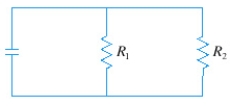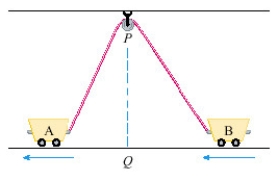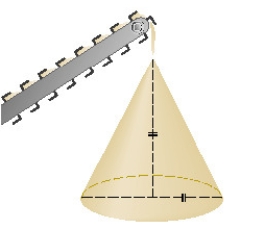Deck 2: Extension G: Limits and Derivatives
Question
Question
Question
Question
Question
Question
Question
Question
Question
Question

Unlock Deck
Sign up to unlock the cards in this deck!
Unlock Deck
Unlock Deck
1/10
Play
Full screen (f)
Deck 2: Extension G: Limits and Derivatives
1
Two sides of a triangle are  m and
m and  m in length and the angle between them is increasing at a rate of
m in length and the angle between them is increasing at a rate of  rad/s.Find the rate at which the area of the triangle is increasing when the angle between the sides of fixed length is
rad/s.Find the rate at which the area of the triangle is increasing when the angle between the sides of fixed length is 
A)
B)
C)
D)
E)
 m and
m and  m in length and the angle between them is increasing at a rate of
m in length and the angle between them is increasing at a rate of  rad/s.Find the rate at which the area of the triangle is increasing when the angle between the sides of fixed length is
rad/s.Find the rate at which the area of the triangle is increasing when the angle between the sides of fixed length is 
A)

B)

C)

D)

E)


2
A plane flying horizontally at an altitude of 1 mi and a speed of  mi/h passes directly over a radar station.Find the rate at which the distance from the plane to the station is increasing when it is 2 mi away from the station.
mi/h passes directly over a radar station.Find the rate at which the distance from the plane to the station is increasing when it is 2 mi away from the station.
A)
B)
C)
D)
E)
 mi/h passes directly over a radar station.Find the rate at which the distance from the plane to the station is increasing when it is 2 mi away from the station.
mi/h passes directly over a radar station.Find the rate at which the distance from the plane to the station is increasing when it is 2 mi away from the station.A)

B)

C)

D)

E)


3
If two resistors with resistances  and
and  are connected in parallel,as in the figure,then the total resistance
are connected in parallel,as in the figure,then the total resistance  measured in ohms ( ),is given by
measured in ohms ( ),is given by  If
If  and
and  are increasing at rates of
are increasing at rates of  and
and  respectively,how fast is
respectively,how fast is  changing when
changing when  and
and  ? Round the result to the nearest thousandth.
? Round the result to the nearest thousandth. 
A)
B)
C)
D)
E)
 and
and  are connected in parallel,as in the figure,then the total resistance
are connected in parallel,as in the figure,then the total resistance  measured in ohms ( ),is given by
measured in ohms ( ),is given by  If
If  and
and  are increasing at rates of
are increasing at rates of  and
and  respectively,how fast is
respectively,how fast is  changing when
changing when  and
and  ? Round the result to the nearest thousandth.
? Round the result to the nearest thousandth. 
A)

B)

C)

D)

E)


4
A baseball diamond is a square with side 90 ft.A batter hits the ball and runs toward first base with a speed of 32 ft/s.At what rate is his distance from second base decreasing when he is halfway to first base? Round the result to the nearest hundredth.

Unlock Deck
Unlock for access to all 10 flashcards in this deck.
Unlock Deck
k this deck
5
Two carts,A and B,are connected by a rope 39 ft long that passes over a pulley (see the figure below).The point Q is on the floor 12 ft directly beneath and between the carts.Cart A is being pulled away from Q at a speed of 2 ft/s.How fast is cart B moving toward Q at the instant when cart A is 5 ft from Q? 


Unlock Deck
Unlock for access to all 10 flashcards in this deck.
Unlock Deck
k this deck
6
Gravel is being dumped from a conveyor belt at a rate of  ft/min and its coarseness is such that it forms a pile in the shape of a cone whose base diameter and height are always equal.How fast is the height of the pile increasing when the pile is
ft/min and its coarseness is such that it forms a pile in the shape of a cone whose base diameter and height are always equal.How fast is the height of the pile increasing when the pile is  ft high? Round the result to the nearest hundredth.
ft high? Round the result to the nearest hundredth. 
A)
B)
C)
D)
E)
 ft/min and its coarseness is such that it forms a pile in the shape of a cone whose base diameter and height are always equal.How fast is the height of the pile increasing when the pile is
ft/min and its coarseness is such that it forms a pile in the shape of a cone whose base diameter and height are always equal.How fast is the height of the pile increasing when the pile is  ft high? Round the result to the nearest hundredth.
ft high? Round the result to the nearest hundredth. 
A)

B)

C)

D)

E)


Unlock Deck
Unlock for access to all 10 flashcards in this deck.
Unlock Deck
k this deck
7
Two cars start moving from the same point.One travels south at  mi/h and the other travels west at
mi/h and the other travels west at  mi/h.At what rate is the distance between the cars increasing 2 hours later? Round the result to the nearest hundredth.
mi/h.At what rate is the distance between the cars increasing 2 hours later? Round the result to the nearest hundredth.
A)
B)
C)
D)
E)
 mi/h and the other travels west at
mi/h and the other travels west at  mi/h.At what rate is the distance between the cars increasing 2 hours later? Round the result to the nearest hundredth.
mi/h.At what rate is the distance between the cars increasing 2 hours later? Round the result to the nearest hundredth.A)

B)

C)

D)

E)


Unlock Deck
Unlock for access to all 10 flashcards in this deck.
Unlock Deck
k this deck
8
A boat is pulled into a dock by a rope attached to the bow of the boat and passing through a pulley on the dock that is 1 m higher than the bow of the boat.If the rope is pulled in at a rate of 1 m/s how fast is the boat approaching the dock when it is 7 m from the dock? Round the result to the nearest hundredth if necessary. 


Unlock Deck
Unlock for access to all 10 flashcards in this deck.
Unlock Deck
k this deck
9
The top of a ladder slides down a vertical wall at a rate of  m/s .At the moment when the bottom of the ladder is 3 m from the wall,it slides away from the wall at a rate of 0.2 m/s .How long is the ladder?
m/s .At the moment when the bottom of the ladder is 3 m from the wall,it slides away from the wall at a rate of 0.2 m/s .How long is the ladder?
A)
B)
C)
D)
E) None of these
 m/s .At the moment when the bottom of the ladder is 3 m from the wall,it slides away from the wall at a rate of 0.2 m/s .How long is the ladder?
m/s .At the moment when the bottom of the ladder is 3 m from the wall,it slides away from the wall at a rate of 0.2 m/s .How long is the ladder?A)

B)

C)

D)

E) None of these

Unlock Deck
Unlock for access to all 10 flashcards in this deck.
Unlock Deck
k this deck
10
If a snowball melts so that its surface area decreases at a rate of  , find the rate at which the diameter decreases when the diameter is 35 cm.
, find the rate at which the diameter decreases when the diameter is 35 cm.
 , find the rate at which the diameter decreases when the diameter is 35 cm.
, find the rate at which the diameter decreases when the diameter is 35 cm.
Unlock Deck
Unlock for access to all 10 flashcards in this deck.
Unlock Deck
k this deck


